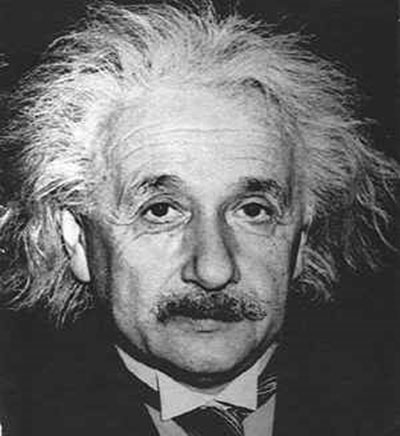ALBERT EINSTEIN'S WORLD OF UNKNOWNS
I truly believe Albert Einstein could have come to know Christ if his intellect and reasoning would let him go beyond the veil to understand the aspect of faith.
What do I mean? Faith goes beyond facts. Faith ties God to man. Faith also brings man to God through the Spirit working in us. If these statements confuse you, then you are now ready to enter "Faith mountain"...a mountain whereby we climb one step at a time. We are saved by grace and by faith we go beyond the veil to see things we cannot see with our eyes, but with faith and a heart tuned to the appropriate channel receiving input beyond the realm of the human mind.
In reading some of the statements made by the genius, Albert Einstein, I think I understand his philosophy of life. However, my understanding of where he was on his spiritual journey is not where I would want my family, friends, or the world to be. I truly believe Albert Einstein was a good man. I truly believe the world is a better place by having Albert Einstein being a part of it for a short time. I truly believe Albert Einstein could have come to know Christ if his intellect and reasoning would let him go beyond the veil to understand the aspect of faith.
In this devotion, I want to provide some Albert Einstein quotes that I think are some of the greatest quotes a person could say, fully mean, and yet not give in to a heart that was yearning for faith in the Creator who made him. He believed in Jesus, but was not willing to see Him as the Savior and the Son of God.
With this information, I want to use these quotes to bring light to a dark and dreary world. Just as there were evil kings who carried out some horrible things that were beyond the scope of cruelty, there were some who changed in the middle of their reign and became a legend in carrying the world to become a better place. It was and is a God thing. Again, however, what they accomplished did not give them rights to the keys to heaven. They might have carried the world to a better and more practical place for humanity; but, their lack of faith in the One and Only God caused their demise and failure to enter into the Garden of God.
Einstein stated quite clearly that he did not believe in a personal God: "It was, of course, a lie what you read about my religious convictions, a lie which is being systematically repeated. I do not believe in a personal God and I have never denied this but have expressed it clearly."
Therefore, the tragic answer is that Einstein did not believe in a personal God. In developing the theory of relativity, however, Einstein realized that the equations led to the conclusion that the universe had a beginning. He did not like the idea of a beginning. Why? Because he thought a person would have to conclude that the universe was created by God. So, he added a cosmological constant to the equation to attempt to get rid of the beginning. But, note this. He said this was one of the worst mistakes of his life because the results of Edwin Hubble confirmed that the universe was expanding and had a beginning at some point in the past. So, Einstein became a deist - a believer in an impersonal creator God:
"I believe in Spinoza's God who reveals himself in the orderly harmony of what exists, not in a God who concerns himself with fates and actions of human beings." Albert Einstein
However, it would also seem that Einstein was not an atheist, since he also complained about being in the same camp as the atheist:
"In view of such harmony in the cosmos which I, with my limited human mind, am able to recognize, there are yet people who say there is no God. But what really makes me angry is that they quote me for the support of such views."
"I'm not an atheist and I don't think I can call myself a pantheist. We are in the position of a little child entering a huge library filled with books in many languages. The child knows someone must have written those books. It does not know how. It does not understand the languages in which they are written. The child dimly suspects a mysterious order in the arrangements of the books, but doesn't know what it is. That, it seems to me, is the attitude of even the most intelligent human being toward God."
Albert Einstein received instruction in both Christianity (at a Roman Catholic school) and Judaism (his family of origin).
"As a child I received instruction both in the Bible and in the Talmud. I am a Jew, but I am enthralled by the luminous figure of the Nazarene." "Any book about Jesus is a shallow look at the impact of Jesus on society. Jesus is too colossal for the pen of phrase mongers, however artful. No man can dispose of Christianity with a bon mot!"
He was asked if he accepted the historical existence of Jesus." Einstein stated, "Unquestionably! No one can read the Gospels without feeling the actual presence of Jesus. His personality pulsates in every word. No myth is filled with such life."
Although Einstein was not a Christian, he had great respect for Jesus, and recognized that He was an amazing figure in history.
Quotations by Albert Einstein:
"The world is a dangerous place to live; not because of the people who are evil, but because of the people who don't do anything about it." Albert Einstein
"Whoever is careless with the truth in small matters cannot be trusted with important matters." Albert Einstein
"Only two things are infinite, the universe and human stupidity, and I'm not sure about the former." Albert Einstein
"If you can't explain it simply, you don't understand it well enough." Albert Einstein
"When the solution is simple, God is answering." Albert Einstein
"The true sign of intelligence is not knowledge but imagination." Albert Einstein
"Only a life lived for others is a life worthwhile." Albert Einstein
"There are two ways to live: you can live as if nothing is a miracle; you can live as if everything is a miracle." Albert Einstein
The quotes seem to find a man with a simple mind; one with a desire to see good in this world. However, this man Einstein was a genius and is considered to have had the most creative mind in the world. His IQ was off the charts and his wit was beyond what most philosophers would hope to have in their lifetime. Simple minded, but filled with imagination and hope for a better tomorrow.
The question of questions: What was the reason Einstein rejected the existence of a personal God?
- Einstein recognized the remarkable design and order of the cosmos, but could not reconcile those characteristics with the evil and suffering he found in human existence. His thinking...How could an all-powerful God allow the suffering that exists on earth?
The Conclusion is:
No, Albert Einstein was not a Christian. He wasn't even a theist (one who believes in a personal God). This was probably because he failed to understand why evil existed. Today, those who fail to understand the purpose of evil not only reject the concept of a personal God, but also reject the concept of God's existence altogether.
The Invitation for the reader:
If you are an agnostic or atheist, the goal for you would be to recognize what Albert Einstein understood about the universe - that its amazing design demands the existence of a creator God. If you do that, then go beyond Einstein's faulty and misunderstanding of the purpose of the universe and consider the Christian explanation for the purpose of human life and why evil must exist in this world.
Accept Jesus today. Know Him "personally." Believe that He lived, died, was raised to new life and is coming again."
From the Word of God...Truth and revelation knowledge in one statement:
- John 11:25-26, Jesus said to her, "I am the resurrection and the life. The one who believes in me will live, even though they die; 26 and whoever lives by believing in me will never die. Do you believe this?"
For you, the reader:
- Romans 10:9-10, "If you declare with your mouth, "Jesus is Lord," and believe in your heart that God raised him from the dead, you will be saved. For it is with your heart that you believe and are justified, and it is with your mouth that you profess your faith and are saved."
- John 14:6, "Jesus answered, "I am the way and the truth and the life. No one comes to the Father except through me."

I hear the Savior say, "Thy strength indeed is small,
Child of weakness, watch and pray, Find in Me thine all in all."
Jesus paid it all, all to Him I owe;
Sin had left a crimson stain,
He washed it white as snow.
Lord, now in-deed I find, Thy power, and thine alone,
Can change the leper's spots, And melt the heart of stone.
For nothing good have I, Where-by the grace to claim;
I'll wash my garments white, In the blood of Calvary's Lamb.
And when, before the throne, I stand in Him complete,
"Jesus died my soul to save," My lips shall still repeat.
Jesus paid it all, all to Him I owe;
Sin had left a crimson stain,
He washed it white as snow.
Written in 1865 by Elvina M. Hall, a 47-year-old, widowed congregant.
website, https://www.godandscience.org/apologetics/einstein.html
